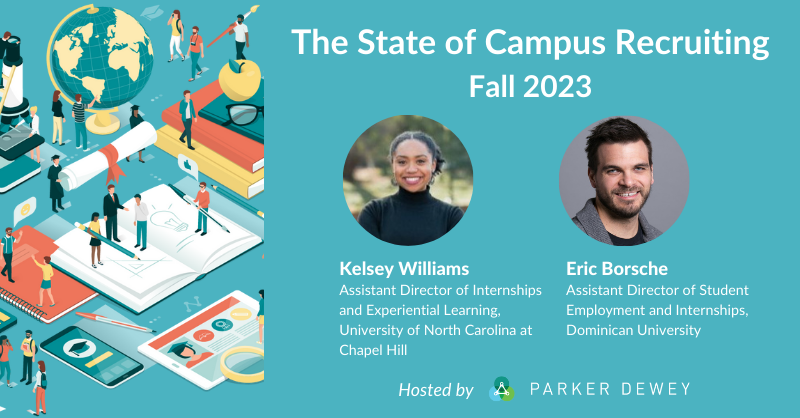
Fall 2023: The State of Campus Recruiting
As the world of work constantly evolves, employers and universities continue to adjust their campus recruiting practices to fit the current landscape. Acknowledging the critical importance of understanding both student needs and evolving employer strategies, our Fall 2023 edition of the State of Campus Recruiting brought together University of North Carolina Chapel Hill’s Kelsey Williams and Dominican University’s Eric Borsche to discuss the ever-evolving recruiting dynamics. The panel provided valuable insights into the most effective recruiting strategies and highlighted the key areas of alignment and disparity between student expectations and employer approaches.
Read on for key takeaways from the conversation, or watch the replay here.
Creativity is Key to Getting Through the Noise and Engaging Students
In a world overflowing with information, grabbing the attention of students requires an extra dose of creativity. Both Kelsey and Eric emphasized the power of unconventional methods to connect with students, encouraging meaningful interactions without the pressure of a formal setting. Kelsey detailed her university's successful Industry Snack and Chats, allowing students to build a more personal rapport with potential employers.“We’re trying to show our students all the different pathways for career exploration,” she noted. “What we're hearing from students is that in that smaller, more personalized environment, students are really able to get a better benefit in attending, versus being in our career fair spaces.”
At Dominican, a Hispanic-serving institution where almost 70% of students are first generation, internships are built into a curriculum centered around career readiness. Eric emphasized the importance of building familiarity between students and recruiters through regular virtual employer visits, creating lasting connections that extend beyond the traditional career fair. “It’s a great way for our students to become familiar with our employers. As they come back to the career fair, students already have some background knowledge,” Eric said. “The students get to know the recruiters a little bit, and it helps build those connections. As they go through their career fair and talk to the employers, they can expand those relationships from freshman to senior year.”
Benefits of Building Relationships with Freshmen and Sophomores
According to Eric, the journey toward successful recruitment begins early in a student's academic career, and employers benefit when they start building those relationships early. This is when they are most open to exploring different companies and roles, especially as “students are so hungry for any opportunity that will help them grow and develop.” By engaging with first- and second-year students, employers not only support skill development and exploration, but also foster a deep-seated relationship with potential candidates that builds their future candidate pipeline.
Eric encourages his students to try their hand at multiple internship experiences throughout their academic career to help them clarify strengths and interests. “Our freshmen and sophomores are eager to pursue these opportunities,” but many employers only have internships for juniors and seniors, he noted. “That's when I direct them toward Parker Dewey [for] a variety of entry-level positions, including basic bookkeeping and some aspects of social media marketing. These roles require 10 to 20 hours of experience, allowing students to test the waters and see if it's the right fit for them. It also serves as a valuable addition to their resumes. Overall, it's a win-win situation for our students."
Understanding What Students Want
A one-size-fits-all approach doesn’t always work for today’s college students, Eric shared. At Dominican, where a large percentage of students are involved in their family businesses, “a lot of our students don't necessarily want the big glory corporate job. They just want to get that hands-on personal touch,” Eric said. “It's a little easier to pair them with the businesses where they can have a lot more of that one-on-one development.”
Focusing on Core Skills in the Recruitment Process
Even at highly ranked schools like UNC, it’s no secret that companies focused primarily on signals like GPA and major are likely missing out on top candidates, while also creating barriers for students who might not fit the mold. Instead, it’s crucial to focus on core skills like coachability, communication, and problem solving. As Kelsey suggests, both universities and employers have an opportunity to help students recognize the skills they’re already building, especially around communication, problem solving, and adaptability. “[In a classroom setting] they're gaining a lot of skills that maybe they wouldn't just put on their resume because it's a part of their class. And that's not always as intuitive. But when they then go to do a project and an internship or even a part-time job, that's when some of those skills actually get to come up and shine,” she said. And as NACE highlighted, these same skills are actually the Core Competencies most valued by employers.
“I think just wanting to only hire on certain majors or a certain GPA creates a situation where an employer could end up not getting the right kind of candidate that they're really looking for. When you do leave things a bit more broad and open, that's really where you do get those students that may not have the most competitive GPA—but they have been doing these different work experiences or doing what they need to do to be able to compete with the rest of their class.”
Kelsey also noted that for employers, emphasizing skill over major in the recruiting process empowers students from different backgrounds to apply to open roles. "Even while crafting job descriptions, consider focusing on the required skills rather than specific majors. This approach ensures that students from different academic backgrounds don't feel disadvantaged and are encouraged to apply, especially if they possess the necessary qualifications to excel in your company,” she said.
“By reframing the approach to consider how the talent can contribute to the company's growth and aligning it with the company's direction and societal goals, you empower a more inclusive and diverse hiring process."
As the campus recruiting landscape continues to evolve, it’s crucial for universities and employers to remain flexible, innovative, and inclusive in their approach. By recognizing the unique needs and aspirations of students and the evolving dynamics of the recruitment process, both students and employers can ensure a mutually beneficial, long-term partnership that nurtures growth, development, and success.
To learn more about how Micro-Internships can strengthen your campus recruiting strategy, schedule time with us today.


.png)
.png)
